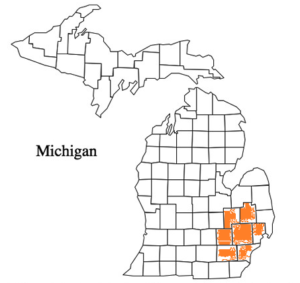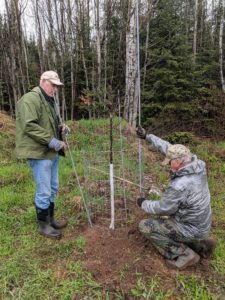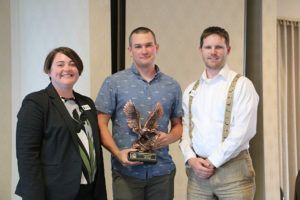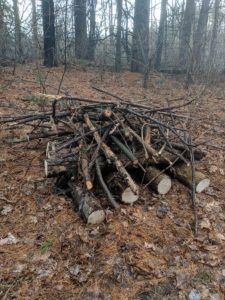Have You Read OTG’s New Monthly Newsletter?
The OTG program has been very successful over the last six years. The growth of the program is heading in the right direction. MUCC has done a great job recruiting volunteers to work with local DNR wildlife biologists to impact more than a thousand acres of public land for wildlife, but there seemed to be a piece missing. When reflecting on the program, there had been some discussion on ways to better communicate with our 2,664 volunteers. The program needed some type of representation to reflect on past projects and keep active volunteers up to date. This winter, an idea had come up to create a monthly newsletter that would highlight upcoming and previous events, as well as include spotlight write-ups of either a volunteer, animal, plant or habitat that had been impacted by the OTG program. The first edition of the monthly newsletter was released in May. This newsletter is a way for MUCC to say thank you for your commitment to the conservation and enhancement of Michigan’s natural resources and reflect on each and every one of our volunteers and partner organizations that have played their part in making OTG successful. We hope to have your continued support of the OTG program. Below are examples taken from sections in the OTG Monthly Newsletter.
Upcoming and Past Projects
We value our volunteers and this newsletter is a way for us to provide information about upcoming events in your area and to recap some of the program’s noteworthy accomplishments (see newsletter examples below).
Upcoming – OTG: Clinton River Clean-Up

Date: Saturday, July 6
Time: 8 A.M. – 2 P.M.
Project: Clean up parts of the Clinton River to improve aquatic habitat and recreational activities
Location: Rochester, MI (meet at Yates Cider Mill)
-Partnership event with Metro-West Steelheaders
-Free lunch & t-shirts
Past – OTG: Gwinn State Forest

On Saturday, May 18, OTG returned to the Upper Penninsula to host a partnership event with the Mid U.P. Chapter of the RGS. A total of 24
volunteers worked to put 85
crabapple trees and 250
fruit shrubs in the ground at several designated sites within the Gwinn State Forest. We had a diverse group of volunteers, among those in attendance were: MUCC president Geroge Lindquist, DNR Wildlife Division Regional Supervisor Terry Minzey, Natural Resources Commissioner David Nyberg, several RGS members, Northern Michigan University students and many more. The trees and shrubs will serve as a food source for grouse and other wildlife that inhabit the area. In total, we impacted 9.3
acres of public land and celebrated a major milestone for the OTG program by reaching our 2,500th OTG volunteer
at this event (click the link and see the Volunteer Spotlight section to read more).
Past – OTG: Gwinn State Forest

On Saturday, May 18, OTG returned to the Upper Penninsula to host a partnership event with the Mid U.P. Chapter of the RGS. A total of 24 volunteers worked to put 85 crabapple trees and 250 fruit shrubs in the ground at several designated sites within the Gwinn State Forest. We had a diverse group of volunteers, among those in attendance were: MUCC president Geroge Lindquist, DNR Wildlife Division Regional Supervisor Terry Minzey, Natural Resources Commissioner David Nyberg, several RGS members, Northern Michigan University students and many more. The trees and shrubs will serve as a food source for grouse and other wildlife that inhabit the area. In total, we impacted 9.3 acres of public land and celebrated a major milestone for the OTG program by reaching our 2,500th OTG volunteer at this event (click the link and see the Volunteer Spotlight section to read more).
Spotlight: Volunteer, Animal, Plant or Habitat
This section of the newsletter features a spotlight write up on either: a volunteer who has gone above and beyond or a plant, animal or habitat that has been directly benefited from OTG’s boots on the ground habitat enhancement work (see newsletter examples below).
Volunteer Spotlight: Alex Schaffer
The members and staff of Michigan United Conservation Clubs gratefully acknowledge the substantial contributions of Alex Schaffer in his role as a volunteer for the On the Ground program. Alex has tirelessly donated his time during several weekends over the last two years to help further the cause of conservation by volunteering at OTG events around the state.
contributions of Alex Schaffer in his role as a volunteer for the On the Ground program. Alex has tirelessly donated his time during several weekends over the last two years to help further the cause of conservation by volunteering at OTG events around the state.
Alex has attended eight OTG events over the last two years. Alex’s passion for improving habitat on public land shines through when you have a conversation with him. He attended the chainsaw safety training we hosted in 2019 to further his skills on OTG projects. He has helped build brush-piles, assembled and checked wood duck boxes, cleared invasive species from public land and even helped build a hunter access boardwalk in a GEMS at the 2018 Annual Convention. To read more about Alex’s contributions to MUCC’s OTG program, please click HERE.
See what Animals or Plants Benefited from OTG this Month!

 The eastern cottontail rabbit is one of the most commonly found mammals in the country. The cottontail is also a popular small game animal here in Michigan. Their preferred habitat includes open fields, field edges and thorny/shrubby brush cover. When removing unwanted woody brush and fallen trees from OTG projects, it is ideal to use the brush and tree logs to build rabbit habitat. The bigger logs on the bottom act as a good base and provide shelter long-term. The smaller branches on top can act as protection from bigger predators who can’t squeeze through the small spaces.
The eastern cottontail rabbit is one of the most commonly found mammals in the country. The cottontail is also a popular small game animal here in Michigan. Their preferred habitat includes open fields, field edges and thorny/shrubby brush cover. When removing unwanted woody brush and fallen trees from OTG projects, it is ideal to use the brush and tree logs to build rabbit habitat. The bigger logs on the bottom act as a good base and provide shelter long-term. The smaller branches on top can act as protection from bigger predators who can’t squeeze through the small spaces.
Look for your edition of the OTG Monthly Newsletter in your email inbox on the 1 st of every month! If you would like to subscribe to the mailing list, please contact MUCC OTG Coordinator Makhayla LaButte: mlabutte@mucc.org or 517-346-6456
The post Have You Read OTG’s New Monthly Newsletter? appeared first on Michigan United Conservation Clubs.
Recent Posts



